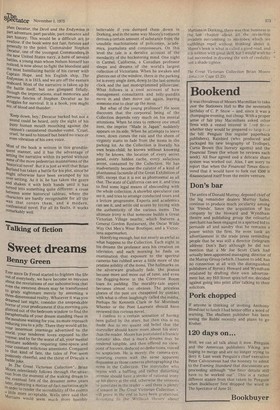Talking of fiction
Sweet dreams
Benny Green
Ever since Dr Freud started to frighten the life out of everybody, we have become so nervous about the revelations of our subconscious that even the sweetest dream may be transformed to grisly nightmare merely by assuming a three-dimensional reality. Whatever it was you dreamed last night, consider the unspeakable horror of your predicament if this morning you glanced out of the bedroom window to find the Paraphernalia of your dream standing there in the sunshine waiting for you, its mute reproach reducing you to a jelly. There they would all be, Your innermost yearnings advertised to the world, your tenderest loves exposed to the voyeur, and by far the worst of all, your mental furniture suddenly requiring time-space and Your constant solicitous attentions. Compared to that kind of fate, the tales of Poe seem Positively cheerful, and the thirst of Dracula a feeble joke.
In The Great Victorian Collection*, Brian Moore relentlessly follows through the situation from the moment of the waking dream to the eventual fate of the dreamer some years later, deploying a matter-of-fact narrative .style in order to render the incredibility of the events a little more acceptable. Wells once said that Martians would seem much more horribly believable if you dumped them down in Dorking, and in the same way Moore's romance derives a certain amount of substance from the unsubtle machinations of policemen, academics, journalists and connoisseurs. On this level the tale is a derisive account of the mendacity of the huckstering mind. One night in Carmel, California, a Canadian professor sleeps and dreams of the world's largest collection of Victoriana. When he awakes and glances out of the window, there in the parking lot is every single item, dow‘i to the last ormolu clock and the last monogrammed pillowcase. What follows is a cool account of how management consultants and telly-pundits move in and then move out again, leaving someone else to clear up the mess.
But what of the young professor? He soon discovers that the corporeal being of the Collection depends very much on his mental attentions. When he tries to remove one small item, the imprint "Made in Japan" suddenly appears on its side. When he attempts to leave town, down comes the rain and the sheen of virginity starts to fade from the items in the parking lot. As the Collection is literally his own brain-child; he knows without knowing why he knows, the location of every secret panel, every hidden cache, every salacious secret, contained by the Collection. He has inadvertently become the curator of a kind of phantasmal facsimile of the Great Exhibition of 1851, except that it is not as phantasmal as all that. The state of California can see it, and tries to find some legal means of absconding with the whole collection. A showbiz speculator can see it, and tries to arrange conducted tours and a lecture programme. Experts and academics can see it, and settle old scores by toying with the authenticity of the various items. The ultimate irony is that someone builds a Great Victorian Village nearby, which features a General Gordon Restaurant, the Oscar Wilde Way Out Men's Wear Boutique, and a Victoriana supermarket.
Horrifying enough, but not nearly as awful as what happens to the Collection. Each night in his dreams the professor sees his creation on television, and each morning he finds on examination that exposure to the spectral cameras has rubbed away a little more of the pristine solidity of the items. The hallmarks on the silverware gradually fade, the pianos become more and more out of tune, and even the flogging-horse in the Correction Room loses its padding. The morality-tale aspect becomes almost too obvious. The priceless glories of the past are cheapened by contact with what is often laughingly called the media. Perhaps Sir Kenneth Clark or Sir Mortimer Wheeler or the Poet Laureate should have reviewed this curious novel.
I confess to a certain sensation of having been gulled by the story, but then this is ng doubt due to my quaint old belief that the storyteller should know more about his story than the reader. Moore has postulated a frankly fantastic idea, that a man's dreams may be rendered tangible, and then offered no viewpoint of his own, deduced no deductions, voiced no scepticism. He is merely. the camera-eye, reporting events with the same apparent dispassion as those cameras photographing the items in the Collection. The storyteller who begins with a baffling and rather disturbing premise should have a stroke of rational irony up his sleeve at the end, otherwise the tensions -he generates in the reader — and there is plenty :)f• tension in The Great Victorian Collection — win prove in the end to have been gratuitous. Reverting to the Wellsian theory about
Martians in Dorking, there was that business in the last chapter about all the invincible invaders succumbing to microbes which we earthlings repel without thinking about it. Moore's book is what is called a good read, and it is written with great skill, but I would wish he had succeeded in drawing the web of credulity iust a shade tighter.
The Great Victorian Collection Brian Moore Jonazhan Cape £3.25)
































 Previous page
Previous page